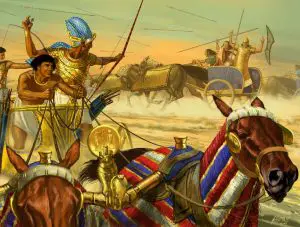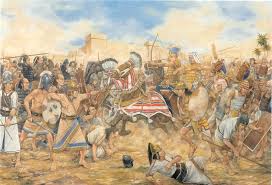Ancient Egypt was an ancient civilization of eastern North Africa, concentrated along the lower reaches of the Nile River. The civilization began around 3150 BC with the political unification of Upper and Lower Egypt under the first pharaoh and continued to thrive over the next three millennia (In Egyptian Battles).

History of Egyptian Battles
 The history of ancient Egypt is divided into three stabilized kingdoms: The Old Kingdom (c.2686-2160 BC), The Middle Kingdom (c.2055-1650 BC) and The New Kingdom (c.1550-1069 BC) separated by two unstable intermediate periods. These periods were characterized by minor battles, political upheavals and revolutions through the wars fought before the beginning of the new kingdom have no written records. Three major wars were fought during the New Kingdom.
The history of ancient Egypt is divided into three stabilized kingdoms: The Old Kingdom (c.2686-2160 BC), The Middle Kingdom (c.2055-1650 BC) and The New Kingdom (c.1550-1069 BC) separated by two unstable intermediate periods. These periods were characterized by minor battles, political upheavals and revolutions through the wars fought before the beginning of the new kingdom have no written records. Three major wars were fought during the New Kingdom.
Battle of Mediggo (c. 1457 BC)
The Battle of Megiddo was fought between Egyptian forces under Pharaoh Thutmose III and a large Canaanite army under the king of Kadesh. It is the first battle to have been recorded in relatively reliable detail. Megiddo was also the first battle to record the use of the composite bow and body count of casualties of war. All details of the battle came from the hieroglyphic writings on the Hall of Annals in the Temple of Amun-Ra at Karnak, Thebes (now Luxor), by the military scribe Tjaneni.
The Battle of Megiddo was an Egyptian victory and resulted in a rout of the Canaanite forces, which fled to safety in the city of Megiddo. Their action resulted in the subsequent lengthy Siege of Megiddo. By re-establishing Egyptian dominance in the Levant, Pharaoh Thutmose III began a reign in which the Egyptian Empire reached its greatest expanse.
Battle of Kadesh (c. 1274 BC)
The Battle of Qadesh (or Kadesh) took place between the forces of the Egyptian empire under Ramesses II and the Hittite empire under Muwatalli II at the city of Kadesh on the Orontes River, of what is now the Syrian Arab Republic. The battle is generally dated to around 1274 BC. It was probably the largest chariot battle ever fought, involving approximately 5,000-6,000 chariots.
Though Egyptian accounts claim that Muwatalli called for a truce, the Hittite records note no such arrangement. However, neither side gained the total victory. The running borderlands skirmishes were finally concluded some fifteen years after the Battle of Kadesh by an official peace treaty in 1258 BC, in the 21st year of Ramses II’s reign, with Hattusili III, the new king of the Hittites. This treaty, which is now on display at the Istanbul Archaeology Museum, is believed to be the earliest example of any written international agreement of any kind.
Battle of the Delta (c. 1178 to 1175 BC)
The Battle of the Delta was a great sea battle, fought between Egyptian forces and the so-called Sea Peoples when the Egyptian Pharaoh Ramesses III repulsed a great sea invasion by the ‘Peoples of the Sea’. The conflict occurred somewhere at the shores of the eastern Nile Delta and partly on the borders of the Egyptian Empire in Syria, although their precise location is unknown.
These Egyptian Battles have been described as ‘the first naval battle in history’. This major conflict is recorded on the temple walls of the mortuary temple of pharaoh Ramesses III at Medinet Habu.
In the end, Egypt was so weakened by this battle that it never recovered to be the powerful kingdom it was prior to the Sea People’s invasion. Ramses III is generally considered to the last great Pharaoh of Egypt’s the New Kingdom. The conflict with the Sea Peoples also drained her treasury. Thus, the Egyptians used to say that death comes from across the seas.